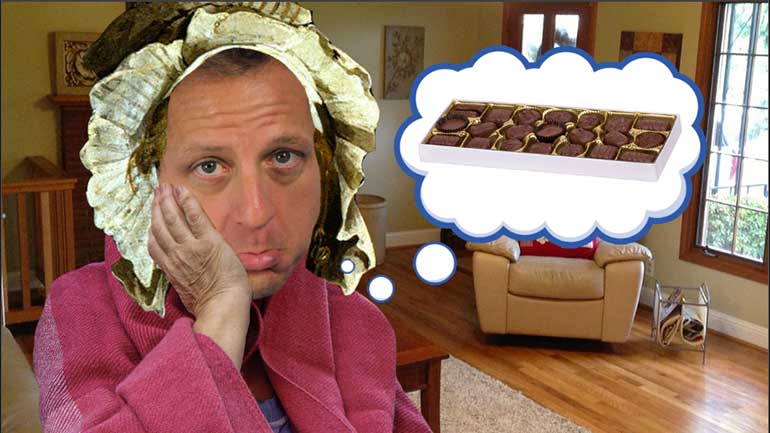ShmoopTube
Where Monty Python meets your 10th grade teacher.
Search Thousands of Shmoop Videos
Modern World History 2.1 Judaism and Democracy 117 Views
Share It!
Transcript
- 00:04
Democracy is pretty cool. It's all about representative government, [A man wearing a suit in a political meeting]
- 00:08
toga parties, and fun carnival games like the hat-into-the-ring toss. So where did
- 00:13
democracy come from? Well, as cool as the founding fathers were, they didn't
- 00:17
exactly pull the ideas behind the Constitution out of a hat. In fact, the [Founding father pulls the constitution out of a hat]
- 00:21
notion that good people can form a good government has its roots in Judaism and
Full Transcript
- 00:26
in Christianity. That's right: when Jesus rose on the third day, he brought
- 00:30
democracy back with him. He also brought t-shirts that said, "I rose from the dead [Jesus appears with a t-shirt]
- 00:34
and all I got was this lousy t-shirt... and democracy." Well, according to the New
- 00:38
Testament, Jesus frequently preached that all people are equal and that leaders [Man holding a Please Help sign and another man appears from a car]
- 00:42
should take care of their followers, while followers should take care of each
- 00:46
other regardless of social class. Pretty obvious idea, right? Well, back in the day
- 00:51
that was crazy talk. Like saying my selfies are all saved in the cloud... it [A girl taking a selfie by a Greek building]
- 00:55
just didn't make sense. In the centuries after Jesus popped down for a visit, left,
- 00:59
came back, and then left again, Christianity clawed its way to the top
- 01:03
of the heap to become the religion of the Western world. The influence of some
- 01:08
Christian beliefs of this time can be found in current democratic political [An open book and a dollar bill appears]
- 01:11
theory, and you don't even have to look too hard. Like, in Christianity, all souls
- 01:16
are equal, right? And if every human being has value, every human being is entitled
- 01:20
to the rights of life and liberty. Hm, where have heard that one before? And [A boy at the front of class discussing Christianity]
- 01:24
because Christianity values the spiritual over the physical, the opinions of
- 01:29
earthly rulers got trumped by scripture back in the day. Eventually, this led [A king hit in the face by the bible]
- 01:34
people to think that one guy shouldn't get to keep all the lovely political
- 01:37
power for himself and that there should be a clear separation between church and [A king and priest on opposite sides]
- 01:41
state... and that was the day fences were invented... Kidding. Anyway, the Christian
- 01:46
Church of olden times was seen as a check on government power, which led to
- 01:49
the idea of a system of checks and balances in government. We knew our
- 01:53
checkbooks would come in handy someday. So, by the time the 16th century rolled [A girl at her desk with a stash of checks]
- 01:57
around, the Catholic Church had a monopoly on Christianity. The Catholic
- 02:00
Church also had some problems. Enter reformers like John Calvin. His
- 02:05
influential book, Institutes of the Christian Religion, first published in [John Calvin reading the Institutes of the Christian Religion book]
- 02:10
1536, asked his readers to determine if they agreed with
- 02:13
the tenants of Catholicism and, if not, to take a sledgehammer to conformity. Calvin [A sledgehammer smashing a TV]
- 02:18
believed that people should be free to choose between and petition ruling
- 02:22
bodies when those bodies do something naughty... and give them coal for Christmas. [A priest carrying coal up his sleeve]
- 02:27
Well, Calvin also used his book to outline the relationship between church
- 02:30
and state and the duties governments have toward their citizens and vice
- 02:33
versa. Hey, duties... sorry. Anyway, besides all of that, Institute's of the Christian [Restroom cubicles and toilet flushes]
- 02:39
Religion was also frequently used during the 16th century as a cure for insomnia...
- 02:43
Get it? Because it was so boring it put people to sleep? All right, moving on. The theology Calvin [A woman falling asleep reading about Christian religion]
- 02:48
developed, aptly called calvinism, went on to play a central role in the
- 02:52
formulation of American democracy. Church and state are super duper separate, right?
- 02:57
Yeah, check. Free enterprise and capitalism go hand-in-hand with
- 03:00
democracy, right? Yep, check. Representative and limited government? Yep, check. Oh,
- 03:04
sorry, we're not asking for the check, we're just teaching here. All right, guess [Waiter appears with a check and walks away]
- 03:08
that's what happens when you try to educate in Applebee's. Hey, are those onion rings?
Up Next
GED Social Studies 1.1 Civics and Government
Related Videos
When you're about to marry the love of your life, not many things could stop you. However, finding out that your future hubby is keeping his crazy...
Here at Shmoop, we work for kids, not just the bottom line. Founded by David Siminoff and his wife Ellen Siminoff, Shmoop was originally conceived...
ACT Math: Elementary Algebra Drill 4, Problem 5. What is the solution to the problem shown?




